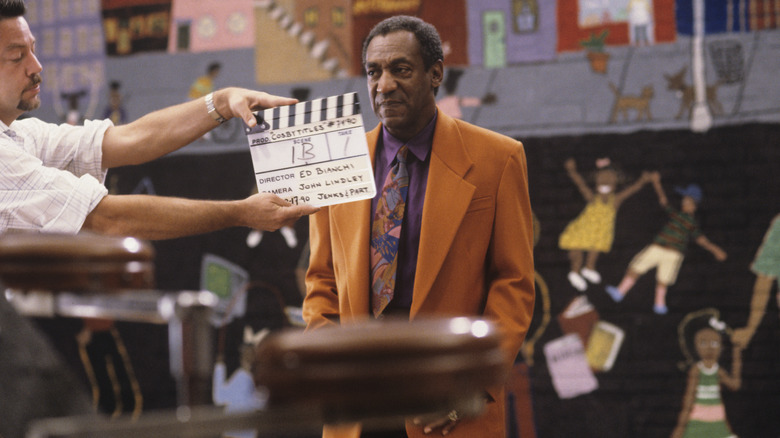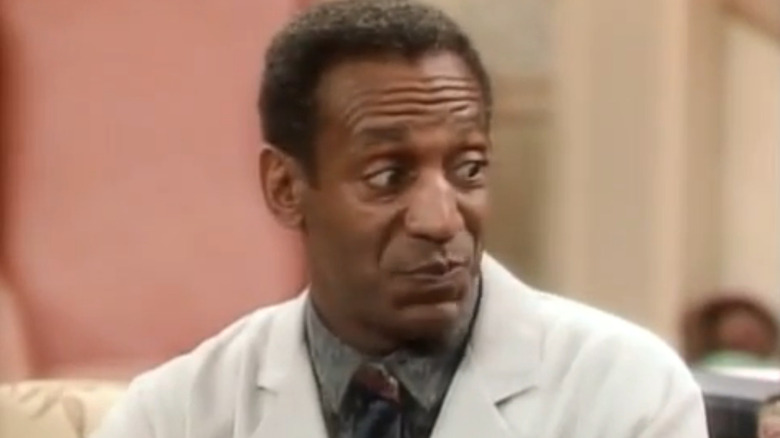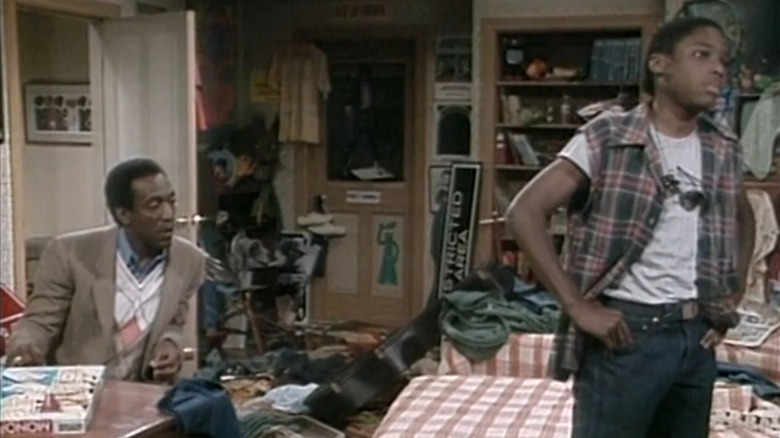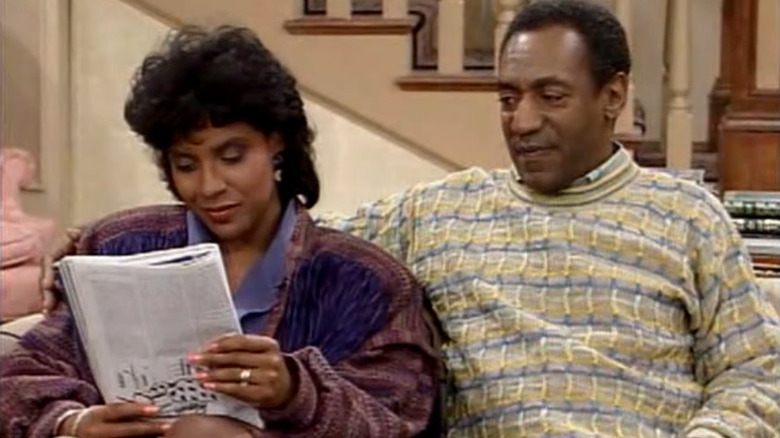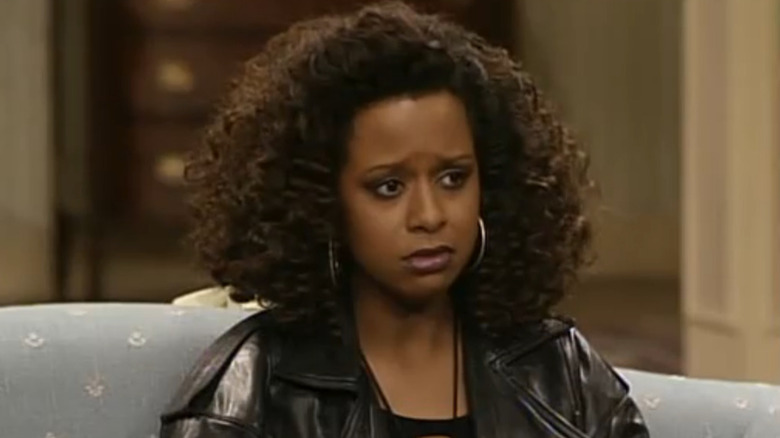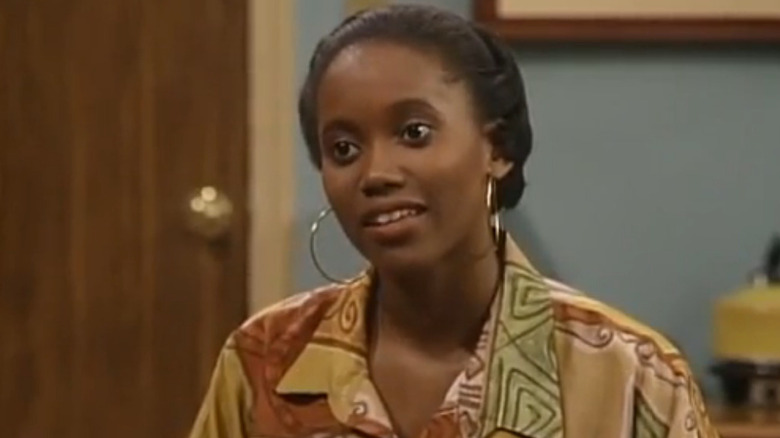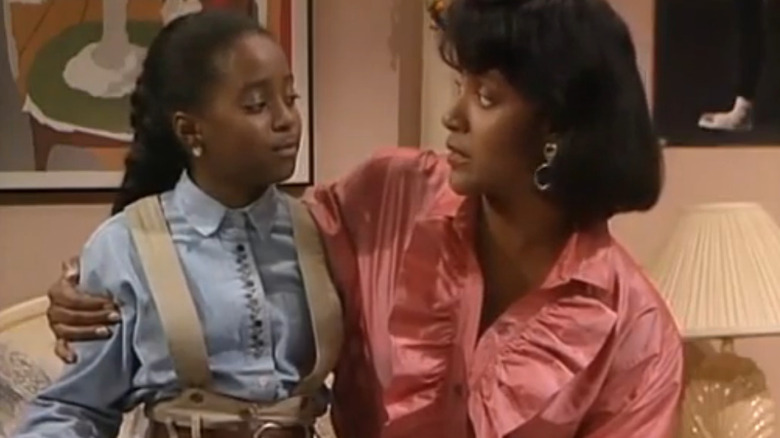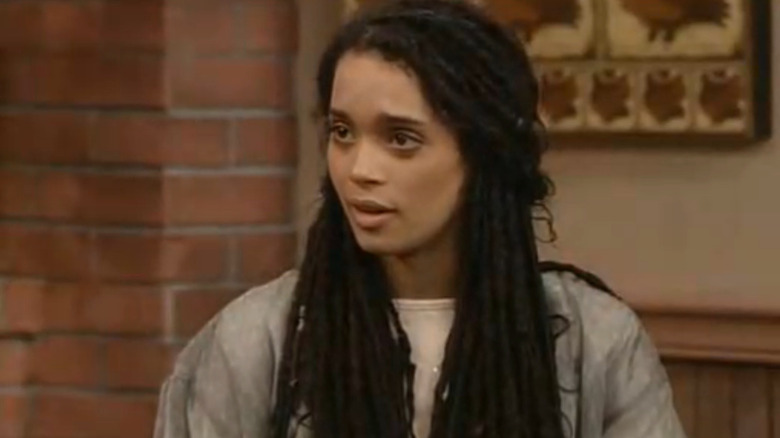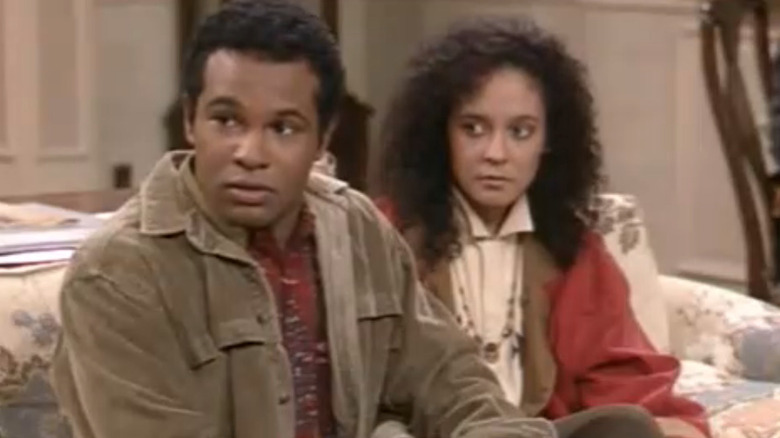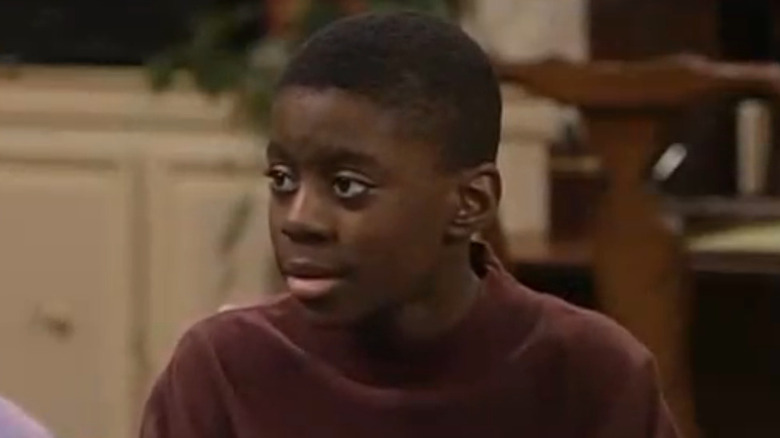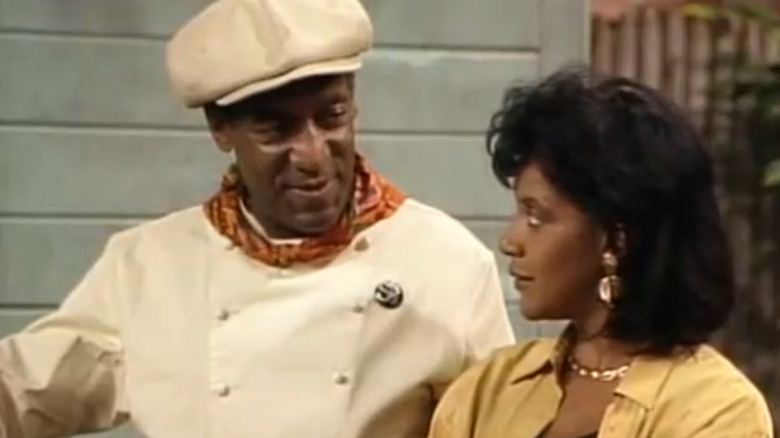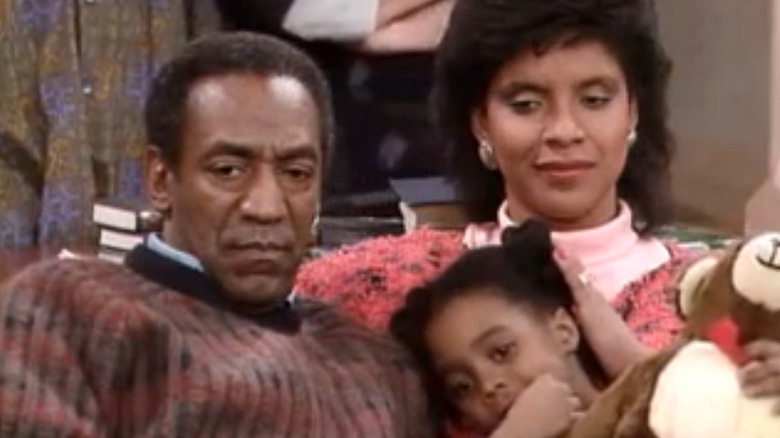Things Only Adults Notice In The Cosby Show
"The Cosby Show," a hit family staple of the '80s, is largedly engrained in the memories of most Americans of a certain age. The show's importance in changing the landscape of Black sitcoms cannot be understated. The beloved series, however, has also been tainted due to Bill Cosby's involvement. Despite the star's actions, some may be able to set aside his problematic behavior to enjoy NBC's cult classic. Others, however, simply can't due to how the show depicted Cosby as a perfect being when in reality, he wasn't. Which beckons the question, how should we remember "The Cosby Show"? Should we praise the beloved series, or did his involvement ravage the tone of the show forever?
Ever since its 1984 release, "The Cosby Show" has been successful. From seizing the No. 1 rated television show in America for five consecutive years (via The TV Ratings Guide) to earning several Emmy awards, its massive success had us look back at the Huxtable household with fond memories.
Due to changing times, however, many of these fond memories may leave us scratching our heads — wondering how we could've missed these moments. Now that we're older and wiser, we may find that "The Cosby Show" looks a lot different than what we remember it as.
Cliff Huxtable being a gynecologist is weird
At a time when TV fathers were constantly belittled by their kids, Dr. Heath Cliff Huxtable was a more competent version of the bumbling dad. He was affectionate, whimsical, thoughtful, and for lack of a better word, over-the-top. As children, his antics throughout the show left us cackling and somewhat jealous because we never knew how fun — yet intelligent — a TV dad could be. However, due to the several cases of sexual misconduct against Bill Cosby, his portrayal of the loving father turns grim as we notice the number of odd anecdotes that should've warned us of his behavior. One example of this can be found in Cliff Huxtable's profession.
Cliff was a doctor (as stated above). What kind of doctor? Well, Dr. Huxtable was an expert in female anatomy. He was an obstetrician-gynecologist who — brace yourself — ran his practice in an office in the basement of his home. Throughout the series, pregnant women would visit his office numerous times because they need an "expert's opinion." He'd also spend a good amount of time in the series working late at the hospital delivering babies. This would fly over our heads due to how loveable both Cliff Huxtable, and Bill Cosby, were. As adults, however, watching him talk about the female anatomy in any way is cringe-worthy based on what we know about the "ever-so-perfect" comedian.
Theodore Huxtable was based on Bill Cosby's late son
We might've missed this as children, but as adults who have some insight into Bill Cosby's family life, it's clear that his TV son, Theodore Huxtable, was heavily based on his late son, Ennis Cosby. Throughout the show, Theodore is constantly criticized for his lack of interest in academics. In the 5th episode of the 6th season, Theodore fails an exam that both he and his parents were confident he would pass. To better understand why that was the case, he and his parents sought the help of a learning specialist. It's later revealed that he has dyslexia, just like Ennis. After learning this, Theodore spends the latter portion of the show coping with his learning disability, leading him to want to help kids with dyslexia.
According to an article in the Tampa Bay Times, how Theodore "triumphed over dyslexia" is in direct correlation with Ennis's life story. From struggling in school to working with kids in community centers, it seems Cosby wanted us to know about his son through Theodore.
Cosby never shied away from incorporating his real family into "The Cosby Show." His TV wife, Clair, shared her maiden name with his actual wife, Camille Olivia Hanks, and his TV parents, Anna and Russell, were named after his real mom and brother. Additionally, the Huxtable residence is home to five children — four girls and one boy — based on his real-life children.
Cliff and Clair can be very judgemental
Bringing your significant other around your parents can be scary — especially if you have parents like Cliff and Clair Huxtable. While we all laughed at Cliff's infamous "how ugly is he" catchphrase in the first episode, the parents of the Huxtable kids can be very passive-aggressive to anyone that decides to have a relationship with their children. From scolding Denise's husband, Martin Kendall, to consistently berating Sondra's husband, Elvin Tibideaux, they interrogated their children's partner on an extreme level on many occasions. Although some of their judgments are understandable, their attitude towards Vanessa's fiance, Dabnis Brickey, was slightly uncalled for. As an adult, you can't help but feel bad for him.
In the 8th season premiere, Vanessa Huxtable returns from college and announces that she's engaged to the 30-year-old man after only knowing him for a year. While the age gap is highly questionable, it seemed like Cliff and Clair were fixated on other aspects of his life. Earlier in the episode, Vanessa stated that Brickey is a maintenance man, which prompted Cliff to turn away in disbelief. Referring to his introduction to the Huxtable family as "steak being served on a garbage lid," it seemed as though Cliff and Clair thought less of him due to his profession. Despite their notion that their lack of hospitality is based on specific circumstances, Cliff quickly changes his tone when he learns that Brickey owns his own house — exclaiming, "Get the gentleman some coffee."
Vanessa's attempt at a music career is sad
Early on, the Huxtable kids take some interesting stabs at life outside their comfortable way of living. While some show promise, like Rudy's "sweet-feet" prowess at American Football, others fall short, like Denise's brief sewing career. Nonetheless, each child dealt with their own challenges in finding their passions. Looking back, however, there seems to be a dark reality layered into Vanessa Huxtable's attempt at a music career.
In an episode titled "How Do You Get To Carnegie Hall?" Vanessa and her friends stumble upon a music contest where the winner gets to audition for a record label. Since the Lipsticks (the name of their group) didn't necessarily have musical gifts, they were willing to use other methods to gain the attention of record company executives. What started as an innocent rendition of Kylie Minogue's "Loco-motion" quickly became a provocative dance routine. Luckily, Vanessa performed the routine in front of her parents, who then scolded her for even thinking of presenting herself in that manner. As children, it was just another goofy antic. Through our adult eyes, however, this seemingly depicts a young woman feeling as though she's required to show some skin to gain opportunities, which many higher-ups in the entertainment business have taken advantage of. "Suppose some fool comes along, sees that, and takes them seriously?" Clair stated fiercely, "Vanessa could end up on a stage, somewhere across the country in a smoke-filled café."
Pam living with the Huxtables is reminiscent of another hit sitcom
In the 4th episode of the 7th season, Pam Tucker, Clair's cousin, comes to stay at the Huxtable residence in Brooklyn Heights, New York. Due to her grandmother's illness, Pam's mother decided to look after her in California, leaving Pam in the caring hands of her relative. Her introduction represented someone who was "street-smart" learning a more reputable way of life. Pam was a vessel through which "The Cosby Show" taught to invoke positive change within the viewers. Through revisiting this, you may find that Pam sounds a lot like Will Smith from "The Fresh Prince of Bel-Air" — who debuted the same year she was introduced.
Pam may not have been born and raised in West Philidelphia, but she shares many similarities with the fresh prince himself. Both were streetwise teenagers taken in by their well-to-do relatives, raised by single mothers, and struggled to fit into the new lifestyle they were shown. An example of their similarities could be found during their very first episodes. Cliff and Clair scolded Pam for attempting to break curfew, while Uncle Phillips scolded Will for ruining dinner with his "flippant shenanigans." Both shows were heavily responsible for the progression of Black sitcoms, so it's interesting to see how "The Cosby Show" introduced a character archetype that was the main focus of "The Fresh Prince of Bel-Air."
Rudy's journey through puberty was well-documented
In the earlier seasons of "The Cosby Show," Rudy Huxtable's role in the series was merely to express the struggles of being the youngest of a big family — alongside having innocent banter with the show's adults. However, this all changed once the series got into its 6th season. Since Rudy was growing, this role was passed down to Denise's stepdaughter, Olivia Kendall. Alternatively, the show's writers focused on Rudy developing into a young woman, something we never saw with Sondra, Denise, and Vanessa. An example of this can be found in the 7th season premiere, where Rudy insists on staying home from school because of her developing body image issues. She begins to worry that something may be wrong with her because certain body parts aren't growing like her classmates are. Although Clair states that she went through the same thing with four other daughters, we never saw these adolescent challenges play out on screen.
As an adult, it would've been nice to see how the show tackled topics regarding puberty more often — like how uncomfortable it is to experience your first period. Since puberty affects everyone differently, it could've helped female viewers within the same age range gain insight through a confusing time. While we did see the four other daughters struggle with self-esteem, dating, and peer pressure, we never saw their journey to womanhood the same way we saw Rudy's.
Denise's character development is questionable
As The Cosby Show went on, you could see Denise Huxtable shift from a brilliant teenager to a somewhat irresponsible adult. From dropping out of Hillman College to traveling to Africa, it seemed like Denise was en route to having a character breakthrough. Sadly, this never becomes the case as Denise returns with a husband (Martin Kendall), a stepdaughter (Olivia Kendall), and no plans for her future.
Alongside her sporadic life endeavors, Denise's appearance on the show became sporadic as well — only appearing in a handful of episodes in seasons four and five and being absent during the final season. From what we know about Bill Cosby behind the scenes, one can assume this is a result of Lisa Bonet's and Bill Cosby's apathetic relationship. Her departure from season 3 was followed by a spinoff (A Different World) that was supposed to see her as the focal point. That was until Bonet became pregnant. According to Page Six, Cosby wasn't too pleased about the pregnancy and decided to fire Bonet from the show.
Additionally, Cosby seemed to have issues with her other life choices, such as her explicit sex scene in "Angel Heart" and her topless photo in Interview magazine. When asked about the ever-growing allegations against Cosby in 2018, she stated, "There was no knowledge on my part about his specific actions, but ... There was just energy. And that type of sinister, shadow energy cannot be concealed (via Net-a-Porter).
Elvin was a problematic 'nice guy'
Like Ross Geller from "Friends" or Ted Mosby from "How I Met Your Mother," Elvin Tibideaux — Sondra Huxtable's seemingly innocent husband — follows the nice guy trope to a T. As children, we may have excused his behavior due to how purely he presented himself. Although he meant well, his introduction in the series showed how he used the "nice guy" attitude to cover problematic qualities. He does get better throughout the show, but the adult in us can't help but tell Sondra to make a run for it.
In the 4th episode of the 2nd season, Sondra mopes around the house after the two broke up ... again. Hoping to make nice with Sondra, he stops by the Huxtable residence to give her flowers. When Clair leaves for work, Elvin's misogynistic views spilled out as he revealed to Cliff that he believes that "it confuses things when women work." Later in the episode, he expresses his beliefs to Clair Huxtable after she offers to pour him and Cliff some coffee — stating, "I never knew you did that kind of thing." In what is now an iconic scene from "The Cosby Show," Clair quickly puts Elvin in his place for carrying such harmful beliefs. "That is what marriage is made of; it is give and take 50/50," Clair states, "And if you don't get it together and drop these macho attitudes, you ain't never gonna have anybody bringing you anything, anywhere, anyplace, anytime, ever!"
Kenny's ideas on gender roles are terrifying
Rudy's friend, Kenny (Deon Richmond), was infamous for quoting and believing sexist comments made by his older brother on the show. As if misogynistic views didn't already exist in "The Cosby Show," Kenny never appeared in the Huxtable residence without making sexist remarks like "a good wife should ask for permission to go out with her friends" or "a baby is the greatest gift a woman could give a man." Thankfully, his involvement with the Huxtables made him realize how toxic these views are — like Elvin.
Watching Kenny adopt this mindset at such a young age is terrifying. Although we laughed at his brother's dullness, this is a reality most impressionable young males face. With the rise of alpha male influencers like Andrew Tate, we could see these dated ideologies still appear through social media, like the belief that men engaging in infidelity is acceptable. As adults, we understand the importance of having a positive role model. Otherwise, we'd develop toxic habits that may take years to break. By revisiting this, we could only praise Rudy for having the patience to deal with Kenny's behavior. Without her, what type of man would Kenny have grown into?
Cliff's barbecue sauce joke was dark
Due to how family-friendly Bill Cosby's work was, a lot of the horrifying context involved in his jokes went over our heads as children. An example of this could be his bit on the Spanish Fly — a herbal stimulant that is supposed to increase sexual desire (via McGill). According to Cosby, if you took a little drop, put it in a drink, and have a girl drink it, she's all yours (via YouTube). Even more horrifying, Cosby never tried to hide his obsession with the herbal aphrodisiac. It was constant material for a lot of his comedic work. You guessed it; one can be found in "The Cosby Show."
The 3rd episode of the 7th season had us follow the Huxtable's tumultuous barbeque. When Denise learns that her brother, Theo, wants to invite a stripper to her husband's belated bachelor party, she then argues with the men in attendance. Ultimately, this ends with everybody coming together for what was a wholesome family dinner. Afterward, you can find Sondra snuggled up to Elvin while Denise is kissing Martin right next to them. To conclude the episode, Cliff Huxtable makes a weird comment about his "barbeque sauce," — stating, "Haven't you ever noticed that after people have my barbeque sauce, after a while when it kicks in, they get all huggy-buggy?" A harmless joke has now turned into a scene that is hard to watch since it warned us of Cosby's wrongdoings.
Their depiction of a Black family isn't necessarily common
Throughout The Cosby Show's run, their focus wasn't on the fact that they were an upper-middle-class African American family — it was merely general knowledge. This helped the series not only avoid negative stereotypes usually found in Black sitcoms but also show that there are many ways a Black family can be shown on television. Despite this, many believe that although the Huxtables presented African Americans positively, the family avoided many systemic disadvantages people of the same race deal with. According to a 1995 article published by the Journal of Black Studies, researchers believed the show failed to identify the harsh world outside the Huxtable household's four walls.
As an adult, you may find that the Huxtable family is privileged enough to be impervious to the struggles of some Black families. For example, not many households can easily afford to put four kids through college like Cliff and Clair did (via Brookings). Not just any college either — we're talking Princeton, Lincoln University, Hillman College (modeled after Hampton University), and New York University. Additionally, the most serious topics in the show appeared through friends and colleagues — not the Huxtables themselves. By realizing this, it may be hard to fully relate to our beloved TV family's struggles since we may not be accustomed to their way of life.
